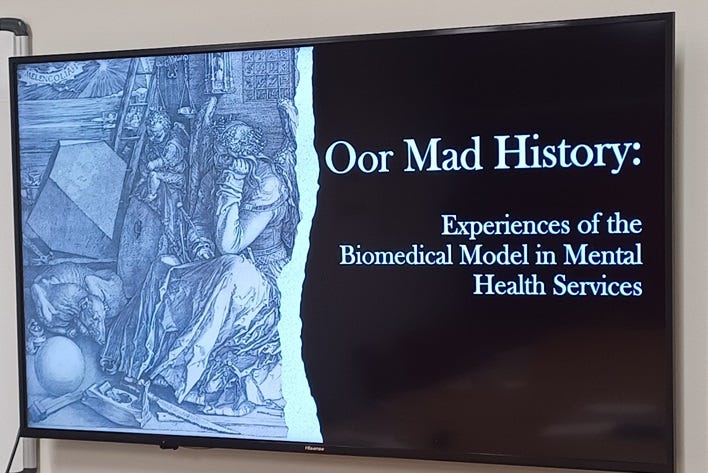Today I attended a really interesting workshop, delivered by CAPS Advocacy.
The workshop provided a review of historical and theoretical contexts, in regards to what is so heavily leaned on by psychiatry: the biomedical model of mental health. The biomedical model asserts that mental experiences are the result of physical processes in the brain and are therefore treatable mainly by pharmaceutical medications.
In the course of discussion, someone offered an incredibly useful metaphor: madness, they suggested, is like a recipe. It is not caused solely by a chemical imbalance within the brain as the biomedical model claims, but rather by mixing together a variety of biological, psychological, emotional and social ingredients. Every person has their own unique recipe for what might lead them to reach the threshold of coping, and to experience extreme states of mental suffering.
My own recipe, for example, looked something like:
1 cup financial stress
1 cup toxic workplace
½ cup peri-menopause
¾ cup feminist fury
4 tbsp spiritual reckoning
½ cup unresolved grief
a sprinkling of panic attacks
Mix thoroughly and bake for 3 sleepless nights.
You get the idea.
So for psychiatry to rely so heavily on pharmaceuticals as a solution to human suffering, really misses the point. Medication may have a role, for some people, and shouldn't be discounted entirely. But the whole premise of 'this is a problem within you that only a pill will fix' is entirely discounting the psychological and social elements that contribute to an individual's state of mind.
Another very salient question raised in this workshop was 'how do you meet your madness?'
I really liked this question, and the answer that arose for me was: as a friend. Why would I think this, when madness has been so disruptive and distressing at times in my life? Ultimately it boils down to the learning and personal growth that madness has offered to me. I wouldn't be me, without all of my life experience – including the tough parts, like psychotic episodes and hospitalisation.
In Mad Studies we talk about the 'awfulisation' of madness, as well as the 'deficit model.' These terms point to the fact that this experience is so commonly assumed to be negative and terrible, something to be avoided, and viewed with fear and loathing. Yet I do wonder what would happen if we welcomed our experiences of madness and invited them into our lives, rather than rejecting and shutting them down. Would this make a difference to how they unfold? If we were to greet madness as a friend who has something valuable to teach us, we might struggle less and work our way through it more quickly or more gently.
And let me add that I'm not meaning to romanticise or idealise madness. It can be a really ugly experience, as I well know. I just think there are different ways it can be framed – some more helpful than others. Condemning it as a terrible and personal misfortune adds to the power of fear and stigma, and contributes to an environment which derails and diminishes one.
So, takeaway from the workshop: madness can be a friend – a tough-talking and challenging friend – as well as a recipe of many different ingredients. A well-spent morning indeed.





